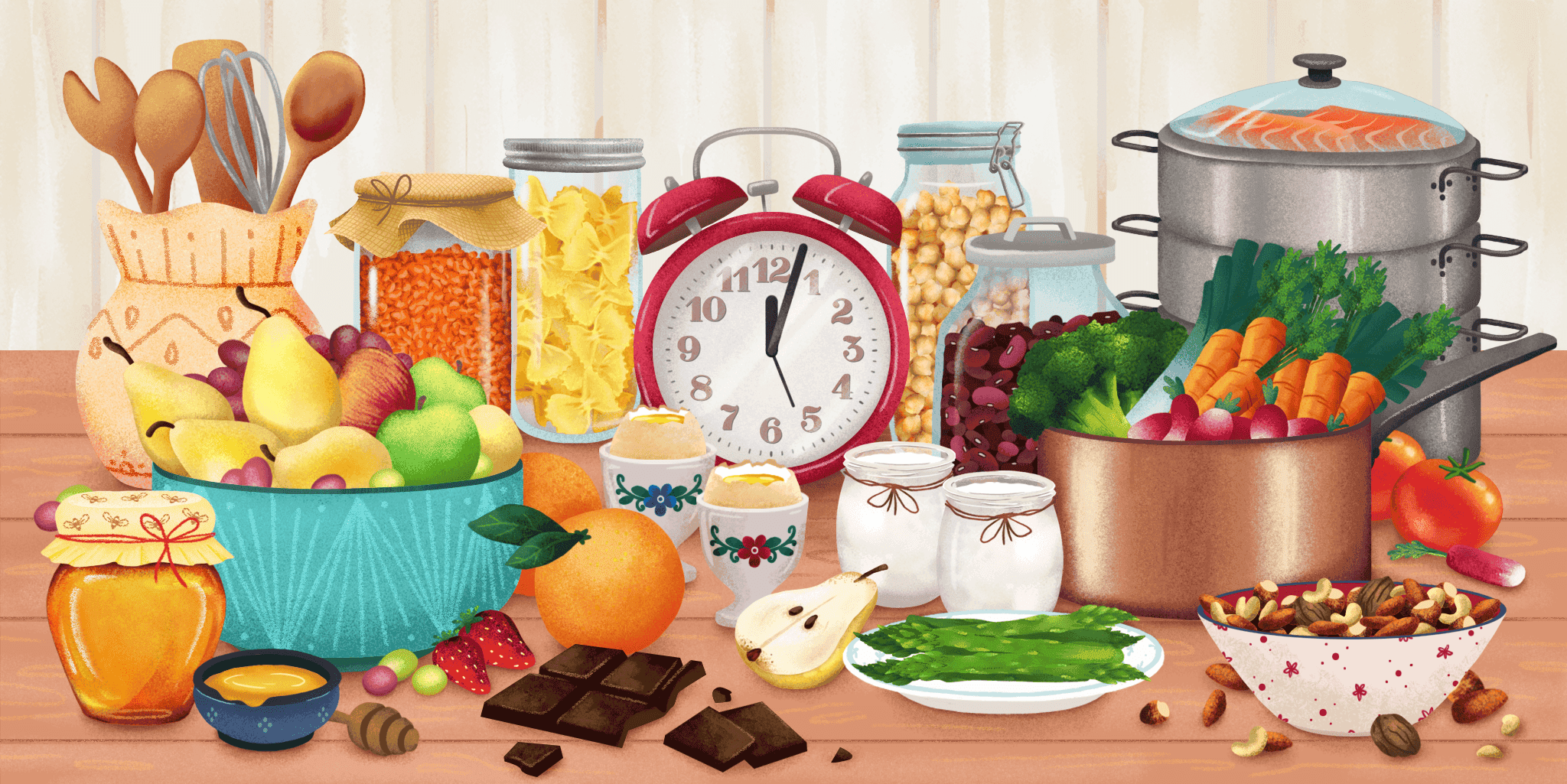
Nutrition is often regarded as the first form of medicine. Indeed, it plays a fundamental role in our health! This article presents 10 essential keys to adopting simple dietary habits that can optimize your health and well-being.
1. Have a savory breakfast!
Most of us eat cereal with milk or buttered white toast with jam alongside a tall glass of orange juice for breakfast. But that breakfast is far from ideal in terms of nutrition. Indeed, that kind of overly sugary meal encourages insulin secretion, which should be avoided — especially in the morning.
It’s best to opt for a savory breakfast. Eating protein in the morning promotes the production of dopamine, a neurotransmitter that stimulates the mind and jump-starts your motivation. In addition to making you more motivated and alert, consuming protein at breakfast can also help you feel full longer and reduce snacking later in the morning.
Eggs are the perfect solution because they contain extremely high quality protein and are rich in vitamins and minerals. But there are other protein sources you can try for variety:
 | Animal protein: one ounce of cheese (preferably goat or sheep milk), a yogurt (goat or sheep milk), sardines or a slice of good ham (from time to time) |
 | Plant-based protein: soy-based vegan pudding packed with protein, chia seeds, nuts (almonds, walnuts, hazelnuts, etc.) |
2. Eat at least 2 to 3 fruits and 2 to 3 servings of vegetables a day
A daily intake of 28 to 32 oz of fruit and vegetables is ideal, i.e. 2 to 3 servings of vegetables (17 oz) and 2 to 3 fruits. For lunch and dinner, choose at least one raw and one cooked fruit or vegetable.
After all, fresh fruits and vegetables are very high in fiber, which has an essential role to optimizing our health. It contributes to satiety and therefore plays an important role in weight management, it helps regulate our blood sugar levels, and it also facilitates digestion and helps balance our gut microbiota.
Fruits and vegetables are also rich in vitamins, minerals and antioxidants. Getting the right amount of antioxidants is particularly important for preventing cancer, degenerative diseases and cardiovascular disease.
Vary the fruits and vegetables on your plate and their colors as much as possible to reap all their benefits!
Warning: fruit juice is not the same as fruit! Juice lacks the fiber that regulates the rate at which sugars are assimilated, so its glycemic index is much higher than that of whole fruit.
3. Eat good fat
The quest to eliminate fat has no scientific or biological basis. In fact, “good fats” are responsible for the proper development of eyesight, brain membranes and neural connections. In addition to being good for the brain, they help reduce cardiovascular risks. So good fat is a crucial ally for good health!
But not all fats are created equal! The problem is not that we eat too much fat these days, but that we eat too much bad fat.
Limit your intake of saturated fats and omega-6, which are currently over-consumed. These fats are found in animal products (meat, butter, cheese, etc.), in some vegetable oils (sunflower, coconut, palm, grape seed) and above all in many processed products (cookies, potato chips, etc.).
On the other hand, make sure you get plenty of omega-3 fatty acids! Omega-3 fatty acids occur primarily in fatty fish (tuna, salmon, mackerel, sardines, etc.), certain oils (canola, linseed, walnut), seeds (chia, flax, hemp) and in some vegetables in very small quantities (watercress, lamb’s lettuce, cabbage). Caution: do not consume tuna or salmon more than once a week, as they generally contain high levels of various pollutants, including heavy metals (mercury, PCBs, dioxins, etc.).
Choose products rich in omega-9 fatty acids. Omega-9 fatty acids occur in large quantities in olive oil, hazelnut oil, avocado, hazelnuts and almonds. In view of the environmental impact of avocados, we recommend eating them only occasionally.
4. Take the time to chew
Chewing may seem like a trivial step and is often neglected; however, it plays an essential role in our health.
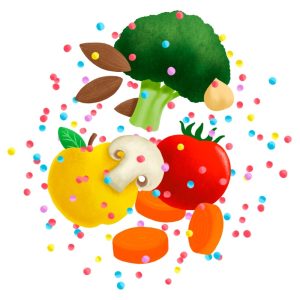 | Better nutrient absorption: good chewing transforms food into nutrients that reach our cells more effectively. |
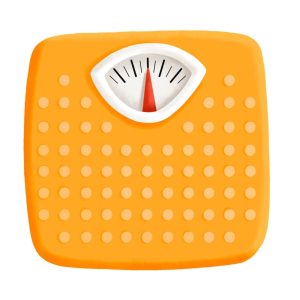 | Eating less and managing weight: chewing triggers various hormones that send a satiety signal to the brain during the meal. |
 | Improving digestion: insufficient chewing forces the stomach to produce more gastric juice to break down large pieces. This excess acid can irritate the digestive lining and cause acid reflux. |
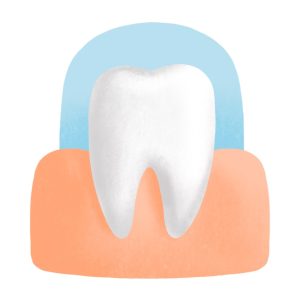 | Protecting teeth and gums: chewing helps prevent cavities by stimulating saliva production, which cleans dental plaque and protects enamel from acidity. It also exercises our gums, essential for good dental health. |
5. Fill up on antioxidants
Antioxidants are extremely beneficial molecules that are crucial to cell protection. They help guard against various afflictions, such as premature skin aging, cancer, degenerative disorders, cataracts, arthritis and cardiovascular disease.
The good news is that these miracle workers occur all around us in our food. Eating generous amounts of fruits and vegetables is usually enough to cover the body’s needs. Here are some foods with particularly high antioxidant properties:
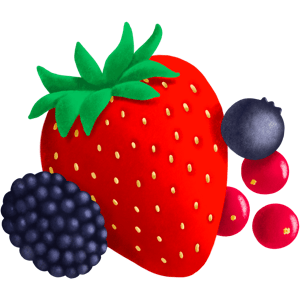 | Berries: blueberries, blackberries, goji berries, acai berries, raspberries, strawberries |
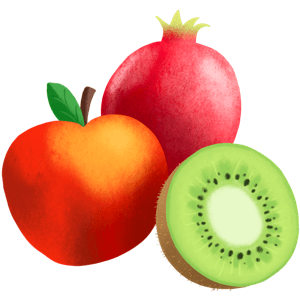 | Other fruits: apples, plums, pomegranates, oranges, kiwis, grapes, figs |
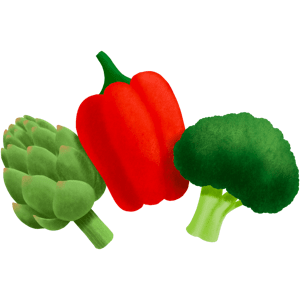 | Vegetables: artichokes, cabbages, broccoli, spinach, bell peppers |
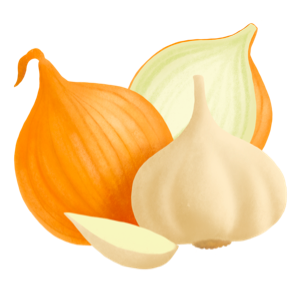 | Allium family: onion, garlic, shallot |
 | Spices: cloves, ginger, turmeric, cinnamon |
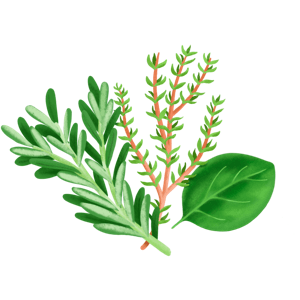 | Herb: thyme, basil, oregano, parsley, chives, dill, mint, rosemary, bay leaf |
 | Hot beverages: tea and coffee |
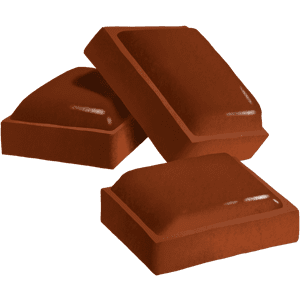 | Cacao and chocolate: pure cocoa powder, dark chocolate (at least 70% cacao) |
You should eat organic versions of these foods because organically grown foods have 20% to 70% more polyphenols (a type of antioxidant found in many vegetables) than conventionally grown foods.
6. Eat mindfully
In our busy lives, many of us eat breakfast at breakneck speed, or gobble up lunch in front of our computers to make the most of our time. We are completely disconnected from our relationship with food.
However, it is important to devote at least 20 minutes to each meal. Mindfulness is about considering a moment in its own right, and paying attention to what we eat.
Applying mindfulness to our eating habits will have several beneficial impacts. First, it enables us to listen to our hunger and satiety signals and ensure that our intake is adapted to our needs. This will reduce the quantities we consume and our cravings for snacks.
Mindful eating also helps develop a preference for healthier foods: when we eat impulsively and emotionally without listening to our bodies, we no longer feel the pleasure of eating, and we are more susceptible to fatty, sweet and salty foods.
Finally, mindfulness also contributes to mental well-being. It allows you to observe your feelings without judgment, and to listen to yourself. Thinking only of the present moment during a meal also helps to still the mind and lower stress and anxiety.
7. Limit your salt intake
Salt is essential to proper body function, but excessive consumption can lead to the development of certain diseases. Today, we consume more than twice as much salt than we really need!
Excessive salt intake increases the risk of high blood pressure. Hypertension itself can lead to heart disease and even stroke. Salt consumption also increases the risk of cancer and stomach ulcers.
There are simple ways to reduce salt intake:
- Limit foods high in salt: ready-made meals, potato chips, cold cuts, pizza, sauces, cheese, etc.
- Opt for alternatives to add flavor to dishes, such as garlic, onion, thyme, chives, basil, lemon, pepper, curry, paprika and all sorts of spices.
- Taste before salting
- Do not add salt to cooking water
- Remove the salt shaker from the table
8. Go vegetarian at dinner
It is recommended to prepare a vegetarian dinner, meaning no meat, fish or eggs. This type of meal will help pave the way for a good night’s sleep.
So, for dinner you should opt for plant-based protein rather than animal protein. Indeed, animal protein encourages the production of dopamine, a neurotransmitter responsible for alertness and motivation. While it is perfect in the morning to rev you up, at night the body needs to make serotonin, a neurotransmitter associated with soothing and sleep regulation.
Serotonin is made from tryptophan, an amino acid found in plant-based protein, such as legumes, soy, brown rice, sunflower seeds and chocolate. The carbohydrates found in legumes and grain products also help optimize serotonin production.
Some foods promote serotonin production, which optimizes sleep quality:
 | Walnuts and almonds: in addition to tryptophan, they contain magnesium, a lack of which can be linked to sleep disorders. |
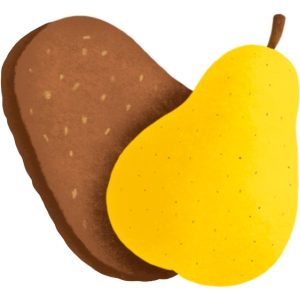 | Carbohydrates (from whole grains and fruits): thanks to insulin secretion, their amino acids will be directed to the brain rather than the muscles. That will make room for tryptophan in the brain, so it is more readily available for serotonin production. |
Furthermore, animal proteins and cooked fats are very demanding for the digestive system: they are made up of molecules that can take a long time to digest.
9. Opt for low-temperature cooking
Cooking at high temperatures erodes the nutritional quality of food: it leads to the destruction of certain vitamins and minerals. Some vitamins are very sensitive to heat, and foods can easily lose 50% of their initial vitamin content during cooking. The longer the cooking time and the higher the temperature, the lower the nutritional content of the food.
In addition, browning food during cooking is accompanied by the production of Maillard bodies, compounds which, in excessive quantities, can increase the risk of developing certain cancers.
Opt for low-temperature cooking, i.e. below 210°F. The most useful method is gently steaming your foods.
10. Eat raw foods and avoid processed foods
Raw food is a product that is sold in its original form and has not undergone any
processing: fruit and vegetables, legumes, eggs, fish, etc. Conversely, processed products
are those that have undergone some form of transformation in order to be sold and which do not occur in this form in nature: ready-made meals, fruit juices and soft drinks, cookies, etc.
Ultra-processed foods have problematic health effects: they are often low in nutrients with a high glycemic load. What’s more, they generally contain little fiber and their texture can be too soft to be satiating.
Finally, consuming processed foods throws the gut microbiota out of balance. As a result, the intestinal microbiota has fewer good bacteria, which are essential to proper body function since they fight pathogens (e.g. parasites and bacteria) and perform essential functions to prevent lifestyle diseases.
Here are some tips for avoiding processed foods:
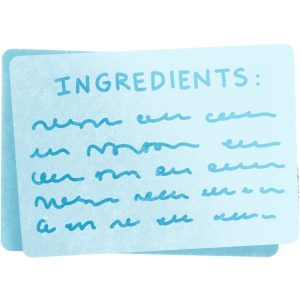 | Go with short ingredient lists, meaning no more than 4 or 5 ingredients. |
 | Avoid products whose ingredient list includes items with complicated names (glucose-fructose syrup, hydrolyzed proteins, modified starch, etc.). |
 | Choose products without problematic additives. Of course, you can use Yuka for this! |
 | Eat as many raw, unprocessed products as possible, that you have prepared and cooked yourself. |
- Hu FB, Stampfer MJ, Rimm EB et al. A prospective study of egg consumption and risk of cardiovascular disease in men and women. JAMA. 1999;281:1387-1394.
- Vorster HH, Benade AJ, Barnard HC et al. Egg intake does not change plasma lipoprotein and coagulation profiles. Am J Clin Nutr. 1992;55:400-410.
- Katz DL, Evans MA, Nawaz H et al. Egg consumption and endothelial function: a randomized controlled crossover trial. Int J Cardiol. 2005;99:65-70.
- Howell WH, McNamara DJ et al. Plasma lipid and lipoprotein responses to dietary fat and cholesterol: a meta-analysis. Am J Clin Nutr. 1997;65:1747-1764.
- Krauss RM, Eckel RH, Howard B et al. AHA Dietary Guidelines: revision 2000: A statement for healthcare professionals from the Nutrition Committee of the American Heart Association. Stroke. 2000;31:2751-2766.
- Swanson D, Block R, Mousa SA. Omega-3 fatty acids EPA and DHA: health benefits throughout life. Adv Nutr. 2012 Jan;3(1):1-7. doi: 10.3945/an.111.000893. Epub 2012 Jan 5. Review.
- Nichols PD, McManus A, Krail K, Sinclair AJ, Miller M. Recent advances in omega-3: Health Benefits, Sources, Products and Bioavailability. Nutrients. 2014;6(9):3727–3733. Published 2014 Sep 16.
- Étude individuelle nationale des consommations alimentaires 3 (INCA 3) – Avis de l’Anses – Rapport d’expertise collective.
- Delgado GE, Krämer BK, Lorkowski S, März W, von Schacky C, Kleber ME. Individual omega-9 monounsaturated fatty acids and mortality-The Ludwigshafen Risk and Cardiovascular Health Study. J Clin Lipidol. 2017 Jan – Feb;11(1):126-135.e5
- Flood-Obbagy, J. E.; Rolls, B. J. The Effect of Fruit in Different Forms on Energy Intake and Satiety at a Meal. Appetite 2009, 52 (2), 416–422.
- Dagfinn Aune, Edward Giovannucci, Paolo Boffetta, Lars T. Fadnes, NaNa Keum, Teresa Norat, Darren C. Greenwood, Elio Riboli, Lars J. Vatten, Serena Tonstad. Fruit and vegetable intake and the risk of cardiovascular disease, total cancer and all-cause mortality–a systematic review and dose-response meta-analysis of prospective studies. International Journal of Epidemiology, 2017; DOI: 10.1093/ije/dyw319
- Tavoularis G., Hébel P., «Fruits et légumes : les Français suivent de moins en moins la recommandation», in: Consommations et modes de vies, CREDOC, n°292, ISSN 0295-9976, Juillet 2017
- Etude NutriNet-Sante : https://info.etude-nutrinet-sante.fr/protectednew/pdf/DOSSIER_PRESSE_Nutrinet-Sante_22_11_12.pdf
- Feder D, Fonseca FLA. Chapter 2 – The Mechanism of Fiber Effects on Insulin Resistance. In: Samaan RA, ed. Dietary Fiber for the Prevention of Cardiovascular Disease. Academic Press; 2017:23-33.
- Patel S. Anti-Obesity and Anti-Diabetes Foods: High Fibre Diets. In: Melton L, Shahidi F, Varelis P, eds. Encyclopedia of Food Chemistry. Oxford: Academic Press; 2019:248-252.
- De Vadder F, Kovatcheva-Datchary P, Goncalves D, Vinera J, Zitoun C, Duchampt A, Bäckhed F, Mithieux G. Microbiota-generated metabolites promote metabolic benefits via gut-brain neural circuits. Cell. 2014 Jan 16;156(1-2):84-96.
- Threapleton DE, Greenwood DC, Evans CE, Cleghorn CL, Nykjaer C, Woodhead C, Cade JE, Gale CP, Burley VJ. Dietary fibre intake and risk of cardiovascular disease: systematic review and meta-analysis. BMJ. 2013 Dec 19;347:f6879.
- Imai S, Fukui M, Kajiyama S. Effect of eating vegetables before carbohydrates on glucose excursions in patients with type 2 diabetes. J Clin Biochem Nutr. 2014 Jan;54(1):7-11.
- BROWNLEE, Iain A., CHATER, Peter I., PEARSON, Jeff P., et al. Dietary fibre and weight loss: Where are we now?. Food Hydrocolloids, 2017, vol. 68, p. 186-191.
- Chandalia M, Garg A, Lutjohann D, von Bergmann K, Grundy SM, Brinkley LJ.
- Beneficial effects of high dietary fiber intake in patients with type 2 diabetes mellitus. N Engl J Med. 2000 May 11;342(19):1392-8.
- Kim Y, Je Y. Dietary fibre intake and mortality from cardiovascular disease and all cancers: A meta-analysis of prospective cohort studies. Arch Cardiovasc Dis. 2016 Jan;109(1):39-54.
- Siri-Tarino, P. W., Sun, Q., Hu, F. B., & Krauss, R. M. (2010). Saturated fat, carbohydrate, and cardiovascular disease. The American journal of clinical nutrition, 91(3), 502-509.
- DiNicolantonio JJ, Lucan SC, O’Keefe JH. The Evidence for Saturated Fat and for Sugar Related to Coronary Heart Disease. Prog Cardiovasc Dis. 2016 Mar-Apr;58(5):464-72. doi: 10.1016/j.pcad.2015.11.006. Epub 2015 Nov 14. Review.
- Patterson E, Wall R, Fitzgerald GF, Ross RP, Stanton C. Health implications of high dietary omega-6 polyunsaturated Fatty acids. J Nutr Metab. 2012;2012:539426.
- Innes JK, Calder PC. Omega-6 fatty acids and inflammation. Prostaglandins Leukot Essent Fatty Acids. 2018 May;132:41-48. doi: 10.1016/j.plefa.2018.03.004. Epub 2018 Mar 22. Review.
- Simopoulos AP. The importance of the ratio of omega-6/omega-3 essential fatty acids. Biomed Pharmacother. 2002 Oct;56(8):365-79. Review. PubMed PMID: 12442909.
- Simopoulos AP. An Increase in the Omega-6/Omega-3 Fatty Acid Ratio Increases the Risk for Obesity. Nutrients. 2016;8(3):128. Published 2016 Mar 2.
- DiNicolantonio JJ, O’Keefe JH. Importance of maintaining a low omega-6/omega-3 ratio for reducing inflammation. Open Heart. 2018;5(2):e000946. Published 2018 Nov 26.
- de Lorgeril M, Salen P. New insights into the health effects of dietary saturated and omega-6 and omega-3 polyunsaturated fatty acids. BMC Med. 2012;10:50. Published 2012 May 21.
- Bernard, Carole & Vanduffel, Steven & Ye, Jiang, 2019. « Optimal strategies under Omega ratio, » European Journal of Operational Research, Elsevier, vol. 275(2), pages 755-767.
- Dhaka V, Gulia N, Ahlawat KS, Khatkar BS. Trans fats-sources, health risks and alternative approach – A review. J Food Sci Technol. 2011;48(5):534–541.
- Iqbal MP. Trans fatty acids – A risk factor for cardiovascular disease. Pak J Med Sci. 2014;30(1):194–197.
- Mozaffarian D, Aro A, Willett WC. Health effects of trans-fatty acids: experimental and observational evidence. Eur J Clin Nutr. 2009 May;63 Suppl 2:S5-21.
- Shah B, Thadani U. Trans fatty acids linked to myocardial infarction and stroke: What is the evidence? Trends Cardiovasc Med. 2019 Jul;29(5):306-310. doi: 10.1016/j.tcm.2018.09.011. Epub 2018 Sep 19. Review. PubMed PMID: 31130187.
- Okubo H, Murakami K, Masayasu S, Sasaki S. The Relationship of Eating Rate and Degree of Chewing to Body Weight Status among Preschool Children in Japan: A Nationwide Cross-Sectional Study. Nutrients. 2018;11(1):64. Published 2018 Dec 29.
- Zhu Y, Hollis JH. Relationship between chewing behavior and body weight status in fully dentate healthy adults. Int J Food Sci Nutr. 2015 Mar;66(2):135-9.
- Ashiga H, Takei E, Magara J, et al. Effect of attention on chewing and swallowing behaviors in healthy humans. Sci Rep. 2019;9(1):6013. Published 2019 Apr 12.
- N’gom PI, Woda A. Influence of impaired mastication on nutrition. J Prosthet Dent. 2002;87(6):667-673.
- Mann T, Heuberger R, Wong H. The association between chewing and swallowing difficulties and nutritional status in older adults. Aust Dent J. 2013;58(2):200-206.
- Furuta M, Yamashita Y. Oral Health and Swallowing Problems. Curr Phys Med Rehabil Rep. 2013;1(4):216-222. Published 2013 Sep 15.
- Furuta M, Komiya-Nonaka M, Akifusa S, Shimazaki Y, Adachi M, Kinoshita T, Kikutani T, Yamashita Y. Interrelationship of oral health status, swallowing function, nutritional status, and cognitive ability with activities of daily living in Japanese elderly people receiving home care services due to physical disabilities. Community Dent Oral Epidemiol. 2013 Apr;41(2):173-81.
- Miquel-Kergoat S, Azais-Braesco V, Burton-Freeman B, Hetherington MM. Effects of chewing on appetite, food intake and gut hormones: A systematic review and meta-analysis. Physiol Behav. 2015 Nov 1;151:88-96.
- Crinnion WJ. Organic foods contain higher levels of certain nutrients, lower levels of pesticides, and may provide health benefits for the consumer. Altern Med Rev. 2010 Apr;15(1):4-12. Review.
- Barański M, Srednicka-Tober D, Volakakis N, Seal C, Sanderson R, Stewart GB, Benbrook C, Biavati B, Markellou E, Giotis C, Gromadzka-Ostrowska J, Rembiałkowska E, Skwarło-Sońta K, Tahvonen R, Janovská D, Niggli U, Nicot P, Leifert C. Higher antioxidant and lower cadmium concentrations and lower incidence of pesticide residues in organically grown crops: a systematic literature review and meta-analyses. Br J Nutr. 2014 Sep 14;112(5):794-811.
- https://presse.inserm.fr/moins-de-cancers-chez-les-consommateurs-daliments-bio/32820/
- Morillo Sarto H, Barcelo-Soler A, Herrera-Mercadal P, et al. Efficacy of a mindful-eating programme to reduce emotional eating in patients suffering from overweight or obesity in primary care settings: a cluster-randomised trial protocol. BMJ Open. 2019;9(11):e031327. Published 2019 Nov 21.
- Mantzios M. Editorial: Mindfulness and Eating Behavior. Front Psychol. 2018;9:1986. Published 2018 Oct 12.
- O’Reilly GA, Cook L, Spruijt-Metz D, Black DS. Mindfulness-based interventions for obesity-related eating behaviours: a literature review. Obes Rev. 2014;15(6):453-461.
- Warren JM, Smith N, Ashwell M. A structured literature review on the role of mindfulness, mindful eating and intuitive eating in changing eating behaviours: effectiveness and associated potential mechanisms. Nutr Res Rev. 2017;30(2):272-283.
- Godfrey KM, Gallo LC, Afari N. Mindfulness-based interventions for binge eating: a systematic review and meta-analysis. J Behav Med. 2015;38(2):348-362.
- Friedman M. Analysis, Nutrition, and Health Benefits of Tryptophan. Int J Tryptophan Res. 2018;11:1178646918802282. Published 2018 Sep 26.
- Jenkins TA, Nguyen JC, Polglaze KE, Bertrand PP. Influence of Tryptophan and Serotonin on Mood and Cognition with a Possible Role of the Gut-Brain Axis. Nutrients. 2016;8(1):56. Published 2016 Jan 20.
- Troynikov O, Watson CG, Nawaz N. Sleep environments and sleep physiology: A review. J Therm Biol. 2018 Dec;78:192-203.
- Tavoularis G., Hébel P., «Fruits et légumes : les Français suivent de moins en moins la recommandation», in: Consommations et modes de vies, CREDOC, n°292, ISSN 0295-9976, Juillet 2017
- Aune et al, Dietary fibre, whole grains, and risk of colorectal cancer: systematic review and dose-response meta-analysis of prospective studies. BMJ 2011.
- Ötles et Ozgoz. 2014. « Health effects of dietary fiber ». Acta Sci Pol, Tech Aliment 191-202.
- Y. Zhu, W. Ling, H. Guo, F. Song, Q. Ye, T. Zou, D. Li, Y. Zhang, G. Li, Y. Xiao, F. Liu, Z. Li, Z. Shi, Y. Yang. Anti-inflammatory effect of purified dietary anthocyanin in adults with hypercholesterolemia: A randomized controlled trial. Nutrition, Metabolism and Cardiovascular Diseases, Available online 17 August 2012, ISSN 0939-4753, 10.1016/j.numecd.2012.06.005.
- Lee S, Choi Y, Jeong HS, Lee J, Sung J. Effect of different cooking methods on the content of vitamins and true retention in selected vegetables. Food Sci Biotechnol. 2017;27(2):333-342. Published 2017 Dec 12.
- Jiménez-Monreal AM, García-Diz L, Martínez-Tomé M, Mariscal M, Murcia MA. Influence of cooking methods on antioxidant activity of vegetables. J Food Sci. 2009;74(3):H97-H103.
- Yuan GF, Sun B, Yuan J, Wang QM. Effects of different cooking methods on health-promoting compounds of broccoli. J Zhejiang Univ Sci B. 2009;10(8):580-588.
- Bastías JM, Balladares P, Acuña S, Quevedo R, Muñoz O. Determining the effect of different cooking methods on the nutritional composition of salmon (Salmo salar) and chilean jack mackerel (Trachurus murphyi) fillets. PLoS One. 2017;12(7):e0180993. Published 2017 Jul 7.
- Andlauer W, Stumpf C, Hubert M, Rings A, Fürst P. Influence of cooking process on phenolic marker compounds of vegetables. Int J Vitam Nutr Res. 2003;73(2):152-159.
- Ferracane R, Pellegrini N, Visconti A, et al. Effects of different cooking methods on antioxidant profile, antioxidant capacity, and physical characteristics of artichoke. J Agric Food Chem. 2008;56(18):8601-8608.
- Carcinogens in Tobacco Smoke: Benzo[a] pyrene from Canadian Cigarettes and Cigarette Tobacco, M.J.Kaisennan, W. S.Rickert, American Journal of Public Health, 1992
- Analysis of 200 food items for benzo[a] pyrene and estimation of its intake in an epidemiologic study, N.Kazerounia et al, Food and Chemical Toxicology 39, 2000
- EFSA – https://www.efsa.europa.eu/fr/efsajournal/pub/4104
- INFOSAN – https://www.who.int/foodsafety/fs_management/No_02_Acrylamide_Mar05_fr_rev1.pdf
- Anses – L’acrylamide dans les aliments : https://www.anses.fr/fr/content/l%E2%80%99acrylamide-dans-les-aliments
- Parada H Jr, Steck SE, Bradshaw PT, et al. Grilled, Barbecued, and Smoked Meat Intake and Survival Following Breast Cancer. J Natl Cancer Inst. 2017;109(6):djw299. Published 2017 Jan 5.
- Uribarri J, Woodruff S, Goodman S, et al. Advanced glycation end products in foods and a practical guide to their reduction in the diet. J Am Diet Assoc. 2010;110(6):911-16.e12.
- Tamanna N, Mahmood N. Food Processing and Maillard Reaction Products: Effect on Human Health and Nutrition. Int J Food Sci. 2015;2015:526762.
- Trevisan AJ, de Almeida Lima D, Sampaio GR, Soares RA, Markowicz Bastos DH. Influence of home cooking conditions on Maillard reaction products in beef. Food Chem.
- Virk-Baker MK, Nagy TR, Barnes S, Groopman J. Dietary acrylamide and human cancer: a systematic review of literature. Nutr Cancer. 2014;66(5):774-790.
- Brownlee M. Advanced protein glycosylation in diabetes and aging. Annu Rev Med. 1995;46:223-234.
- Anne Moorhead, S.; Welch, R. W.; Barbara, M.; Livingstone, E.; McCourt, M.; Burns, A. A.; Dunne, A. The Effects of the Fibre Content and Physical Structure of Carrots on Satiety and Subsequent Intakes When Eaten as Part of a Mixed Meal. Br. J. Nutr. 2006, 96 (3), 587–595.
- Haber, G. B.; Heaton, K. W.; Murphy, D.; Burroughs, L. F. Depletion and Disruption of Dietary Fibre. Effects on Satiety, Plasma-Glucose, and Serum-Insulin. Lancet 1977, 2 (8040), 679–682.
- Flood-Obbagy, J. E.; Rolls, B. J. The Effect of Fruit in Different Forms on Energy Intake and Satiety at a Meal. Appetite 2009, 52 (2), 416–422.
- Gustafsson, K.; Asp, N. G.; Hagander, B.; Nyman, M.; Schweizer, T. Influence of Processing and Cooking of Carrots in Mixed Meals on Satiety, Glucose and Hormonal Response. Int J Food Sci Nutr 1995, 46 (1), 3–12.
- Lioger, D.; Fardet, A.; Foassert, P.; Davicco, M.-J.; Mardon, J.; Gaillard-Martinie, B.; Remesy, C. Influence of Sourdough Prefermentation, of Steam Cooking Suppression and of Decreased Sucrose Content during Wheat Flakes Processing on the Plasma Glucose and Insulin Responses and Satiety of Healthy Subjects. J Am Coll Nutr 2009, 28 (1), 30–36.
- Burton, P.; Lightowler, H. J. Influence of Bread Volume on Glycaemic Response and Satiety. Br. J. Nutr. 2006, 96 (5), 877–882.
- Bligh, H. F. J.; Godsland, I. F.; Frost, G.; Hunter, K. J.; Murray, P.; MacAulay, K.; Hyliands, D.; Talbot, D. C. S.; Casey, J.; Mulder, T. P. J.; et al. Plant-Rich Mixed Meals Based on Palaeolithic Diet Principles Have a Dramatic Impact on Incretin, Peptide YY and Satiety Response, but Show Little Effect on Glucose and Insulin Homeostasis: An Acute-Effects Randomised Study. Br. J. Nutr. 2015, 113 (4), 574–584.
- Bleiweiss-Sande, R.; Chui, K.; Evans, E. W.; Goldberg, J.; Amin, S.; Sacheck, J. Robustness of Food Processing Classification Systems. Nutrients 2019, 11 (6).
- Fardet, A.; Rock, E. Perspective: Reductionist Nutrition Research Has Meaning Only within the Framework of Holistic and Ethical Thinking. Adv Nutr 2018, 9 (6), 655–670.
- Louzada, M. L. da C.; Ricardo, C. Z.; Steele, E. M.; Levy, R. B.; Cannon, G.; Monteiro, C. A. The Share of Ultra-Processed Foods Determines the Overall Nutritional Quality of Diets in Brazil. Public Health Nutr 2018, 21 (1), 94–102.
- Moubarac JC, Batal M, Louzada ML, Martinez Steele E, Monteiro CA. Consumption of ultra-processed foods predicts diet quality in Canada. Appetite. 2017;108:512-520.
- Rauber, F.; Louzada, M. L. da C.; Steele, E. M.; Millett, C.; Monteiro, C. A.; Levy, R. B. Ultra-Processed Food Consumption and Chronic Non-Communicable Diseases-Related Dietary Nutrient Profile in the UK (2008–2014). Nutrients 2018, 10 (5).
- Machado, P. P.; Steele, E. M.; Levy, R. B.; Sui, Z.; Rangan, A.; Woods, J.; Gill, T.; Scrinis, G.; Monteiro, C. A. Ultra-Processed Foods and Recommended Intake Levels of Nutrients Linked to Non-Communicable Diseases in Australia: Evidence from a Nationally Representative Cross-Sectional Study. BMJ Open 2019, 9 (8), e029544.
- Martínez Steele E, Popkin BM, Swinburn B, Monteiro CA. The share of ultra-processed foods and the overall nutritional quality of diets in the US: evidence from a nationally representative cross-sectional study. Popul Health Metr. 2017;15(1):6. Published 2017 Feb 14.
- Fardet, A. Characterization of the Degree of Food Processing in Relation With Its Health Potential and Effects. Adv. Food Nutr. Res. 2018, 85, 79–129.
- Costa, C. S.; Del-Ponte, B.; Assunção, M. C. F.; Santos, I. S. Consumption of Ultra-Processed Foods and Body Fat during Childhood and Adolescence: A Systematic Review. Public Health Nutr 2018, 21 (1), 148–159.
- Srour B, Fezeu LK, Kesse-Guyot E, et al. Ultra-processed food intake and risk of cardiovascular disease: prospective cohort study (NutriNet-Santé). BMJ. 2019;365:l1451. Published 2019 May 29.
- Costa, C. S.; Del-Ponte, B.; Assunção, M. C. F.; Santos, I. S. Consumption of Ultra-Processed Foods and Body Fat during Childhood and Adolescence: A Systematic Review. Public Health Nutr 2018, 21 (1), 148–159.
- Hall KD, Ayuketah A, Brychta R, et al. Ultra-Processed Diets Cause Excess Calorie Intake and Weight Gain: An Inpatient Randomized Controlled Trial of Ad Libitum Food Intake [published correction appears in Cell Metab. 2019 Jul 2;30(1):226]. Cell Metab. 2019;30(1):67-77.e3.
- Vandevijvere, S.; Jaacks, L. M.; Monteiro, C. A.; Moubarac, J.-C.; Girling-Butcher, M.; Lee, A. C.; Pan, A.; Bentham, J.; Swinburn, B. Global Trends in Ultraprocessed Food and Drink Product Sales and Their Association with Adult Body Mass Index Trajectories. Obes Rev 2019, 20 Suppl 2, 10–19.
- Nardocci, M.; Leclerc, B.-S.; Louzada, M.-L.; Monteiro, C. A.; Batal, M.; Moubarac, J.-C. Consumption of Ultra-Processed Foods and Obesity in Canada. Can J Public Health 2019, 110 (1), 4–14
- Chambers, Lucy. (2016). Food texture and the satiety cascade. Nutrition Bulletin. 41. 277-282. 10.1111/nbu.12221.
- Tremblay, A.; Bellisle, F. Nutrients, Satiety, and Control of Energy Intake. Appl Physiol Nutr Metab 2015, 40 (10), 971–979.
- Fardet, A. Minimally Processed Foods Are More Satiating and Less Hyperglycemic than Ultra-Processed Foods: A Preliminary Study with 98 Ready-to-Eat Foods. Food Funct 2016, 7 (5), 2338–2346.
- Fiolet, T.; Srour, B.; Sellem, L.; Kesse-Guyot, E.; Allès, B.; Méjean, C.; Deschasaux, M.; Fassier, P.; Latino-Martel, P.; Beslay, M.; et al. Consumption of Ultra-Processed Foods and Cancer Risk: Results from NutriNet-Santé Prospective Cohort. BMJ 2018, 360.
- Zinöcker, M. K.; Lindseth, I. A. The Western Diet–Microbiome-Host Interaction and Its Role in Metabolic Disease. Nutrients 2018, 10 (3).








Julie, very good article and now I will have to lay off the cheese I eat a lot. Can you give some advise on protein as far as Whey and Soy protein? Thanks
Awesome!
Great article! I’m going to share it with all my family and print it to post on my fridge 💓
Hi, I much appreciate your knowledge ☺️ Thank youuuuuu 🙏
Very informative article.
Thank you!
Great advice!!!
Your article is brilliant,and I’m happy to learn,thanks to your article I’m eating good food stuffs ,most informative,will share with friends and family.
First article I have read from Yuka. All common sense but excellent length and simple to read
Thanks for the simple yet informative article.
Informative.Good read.
Thanks
Great reading . Thank you I I can change a little bit. Knowing it will be beneficial. ; )
Hi Yuka friends, tell me about medjool dates, are they low on the glycemic index?
I recently found a recipe that uses them. Will they raise my blood sugar much?
Thank you
Thanks a lot for the article, great information!! I a bless to have dedicated people to our wellbeing in this time!! Keep up the goodwork!!
I’m on a kidney stone diet so your recommendations are good for normal people but for me they’re not good at all but thank you for sharing your article with the majority of people that don’t have to worry about kidney stones and if you don’t have a kidney stone eating some of this stuff can give you kidney stones
There is so much to think about.
Eating more fruit and veg is great but how to offset the forever chemical issue.
Pesticide residues are in most things. Microplastics.
We need advice on mitigating the possible combined effects of these probably toxic chemicals. Bowel cancer rates in young people are up. The future looks bleak not hopeful.
Sorry I’m in the aftermath of the Trump horror story.
I am new to your app, use it everyday, very informative, good information, many thanks.
You haven’t addressed for someone like me…. a bad sleeper who does at least 3 hours exercise most days burning up to an extra 1200 calories… I tend to crave carbs after this… is this ol and a normal response etc?
This was a great article! I have the app and I use it almost every day! Thank you!
Thank you for your informative and concise article. I’m new to Yuka but am enjoying the app. I’ve started a list of preferred foods and begun trying a few new choices.
do you have suggestions on diabetic foods and diets
I like to give personal input. Iam a retired butcher meat curing smoking processor with over 40 years experiance. I just completed 3 mts. On a carnavor diet . Now Iam adding fruit veggies & salad with 24hr.to 72 hrs fasting intervals. I lost 25 lbs so far want to loose 25 more .
I like the app so far but like to see more info like why you say things are good or bad.
Do you suggest balanced recipes that help gastro problems ?
Very informative article. Any suggestions for foods if you have Hashimoto’s and some of these suggestions are triggers?
After years of eating a high protein, high fiber diet my doc has put me on low fermentation low FODMAP. It is my hope that after SIBO treatment I will be able to reintroduce the suggestions in your article. Thanks a bunch
Thank you very much for grateful information, very interesting, will keep us healthy.
Great article. Packed with very useful information! Thank you.
That was a wonderful article and very helpful thank you
Grateful for the information!
Love this site! So helpful and informative. Thanks
Wonderful information! Thank you for keeping us healthy.
Fantastic Info! Thank you!
Very helpful. Thank you so much
Thanks. Interesting and very informative.
Really interesting and helpful article, thanks for the explanation of different fats especially the Omega range
Thanks for this article. It reinforces my aim to keep on eating more nutritiously on a daily basis. I feel healthier, less bloated, have more energy and my skin is reaping the benefits. As for Yuka, this has been a gamechanger for me. I have stopped using expensive face creams (one brand for 30 years) and bought those recommended on the app. I think it should be displayed on beauty counters, billboards and the like because the toxic ingrediants in these products should be exposed for what they are: a health hazard to men, women and children alike. Well done Yuka!
I’m really benefiting from using your Yuka App. Thank you. I have recently been diagnosed with diverticulitis and it is a great help in assessing the foods I can eat at the moment. It also keeps my cholesterol in check! Thank you!
Thank you for the very informative and helpful article. I will certainly give these recommendations a try. Best wishes!
Thanks for the information in this article. I am learning to eat healthier after many years of being less than conscientious about it. These tips are very helpful!
Loved your article. And I appreciate your app. Yuka is our new resource when we go for groceries. My husband is always saying, “check this food item out with yuka”. Aiming to eat healthier this year.
I eat quorn and I think it is considered highly processed food but when I scan with Yuka any quorn product, it’s excellent!
Why is that?
Thank you. Super useful and digestible!
Thank you for this great article – its extremelyinformative! Love the app ❤️
Great article!
Thank you for this useful information. Easily digestable. hee
Great article! Thank you!
Very informative and good information. Thanks
Great information and easy to understand!
Brilliant, very informative
Really informative and helpful. Not too heavy a read. Learned quite a bit as it clarified a few things. Thanks
Discovering your ap has been a life changer. am recommending it to everyone.
Brilliant …. Read
gives you a good reminder …. On getting back on track …
Thank you
The suggestion of coffee and tea is counterintuitive. Also, eating early dinner like 5-6 hours before bed would be just as affective than going vegetarian for dinner.
Brilliant as always. On blood thinners so very useful. No Vitamin K though?
Thank you! Very good article. As a Certified Health Coach I am interested in and read a large volume of information. I appreciate your clear, concise and useful presentation.
Excellent information supporting and growing my knowledge. Thank you
amazing information. looking forward to reading more information
This I’d an amazing app thank u
Thank you. I found this to be very helpful.
Great!
Very interesting . I try to follow a healthy diet for myself and to provide the same for my family. I have been keen to learn about good nutrition and ideas for many years. This is a great app . So many products are misleading and I have learnt to read the ingredients on items I am looking to purchase as sometimes the advertising tries to trick you into believing something is more healthy than it really is
A very interesting article. I cook porridge oats for breakfast with oat milk and a mix of seeds.
Would I be better eating this in the evening as a snack and having a higher protein breakfast ?
How much is to join the club.
KEEP DOING WHAT YOU ARE DOING & EXPANDING THIS APP!! IMPRESSIVE! I CONTINUE TO SHARE WITH FRIENDS & FAMILY!
What are the environmental impact of avocados??
Love this Yuka app, easy, informative and fun to use. Thank you 😊
Yuka is life changing and I have been recommending you guys to everyone around me. I did not think that some processed foods I regularly ate were worse than junk. Thanks for being there, and I hope you won’t become funded in the future, but keep being as you are now, and if needed, all of us healthy and responsible food-seekers can help you 🙂
Scan, scan, scan and lead a healthy, fulfilling, guilt and anxiety free life <3
My Dr. suggested I use your app a couple of weeks ago and I absolutely love it! I’m sure I drive people crazy at the grocery store now, scanning everything, but this and my new healthy diet have already helped me lose weight and feel better. Thank you!
Not in agreement with number 7 & 8 … but everything else is on point!! Love this app, it has been so helpful and informative. Thank you!!!
Why do you think that is not the case?
You know in our Hindu scriptures it is written that we should eat depending on the Sun since our life is literally rotating around it. So in the morning and night we should eat light food and at noon heavy food because the sun is at its peak then. At night we should eat light food because your body will have easier time to digest the food and channelize more energy towards healing.
Agree with all of this info. Much trusted! Love the app and many friends now use it!
Great information love it. What is the price to become a member 🤔
Love the app and very interesting article, thank you
Thank you for this excellent advice and for the app itself.
Thanks, very useful and interesting.
I use Yuka frequently when shopping!
I was introduced to Yuka a few weeks ago & am astounded at how helpful your site is. So many products I thought were ok to consume are NOT! My food choices are now more responsible & healthier. Thank you!!
Hi,
I have the occasional ready meal and on the Yuka app they have always come out as excellent or good, so I’m a little confused when you recommend not eating ready meals. Are they ok for you or not?
No all ready meals are equal. Use Yuka to see which ones are better.
I just love your info. Most shoppers don’t read the ingredients in the products. I personally feel we are fed great tasting foods that we don’t read about or don’t understand what the labels mean and eventually end up going to the doc with high BP or diabetes or more. Our choice tho right?
Great article on “The 10 keys to eating healthy”
My husband and I are going to incorporate some of these recommendations to our diet immediately. Thanks Anthony & Yuka.
Thank you for y help!
Thank you for everything it has helped in being more healthier knowing more
I’m curious about your opinion on seed oils. My stepson insists that these are not healthy to include in one’s diet and can be found as additives in our foods.
All this is very well a d informative, however I suffer from I.b.s and find eating fruit and veg very painful, I can eat small quantities but could never eat the amounts suggested, so what can I do to get healthy? Any advice would be greatly received..Thank-you Julie x
Hello Julie,
My younger brother suffers from IBS too. You might already be familiar with the low-FODMAP diet, but he has been sticking to this diet and has had a lot of success. Sticking to this diet is certainly a time-intensive process, but could help you too. Some low-FODMAP fruits and vegetables are blueberries, strawberries, grapes, oranges, carrots, cucumbers,spinach, and bell peppers. Hope this helps!
I also have IBS, and I have learnt to live with it very successfully. Vary the fruit and vegetables. Potato is the easiest to digest. Exercise is crucial to taming the effects of IBS; make sure you have plenty of fibre and protein throughout the day. I use whey protein after an hour of exercise in the morning, and at first this will feel counterproductive as it may bloat you and cause more wind, which we get more than enough of anyway, right? lol. After a few weeks, this will calm down, and you will tolerate it much more. Stick to meal times, not so much the regularity but actual times of the day; your body becomes more accustomed and better able to digest. I always have at least one yoghurt a day, which seems to break down the production of wind even further. Walk 20-30 minutes after your evening meal; this will really help digestion. If you find a particular food causes you more discomfort, lower the amount you eat, then gradually increase it over time; this builds your tolerance up, and eventually you will be able to eat more. Do not eat processed foods unless you absolutely have to.
Please start listening to Dr Anthony Chaffee, Dr Ken Berry, and Sally K Norton. Sally’s book “Toxic Superfoods” is an eye opener. They’re all on YouTube. I’ve had 30+ years of ulcerative colitis gone with going carnivore. There are too many success stories of all kinds to ignore our ancestral way of eating. Good luck.
Thank you very much for your interesting article. It would be great if you had mentioned about fermented food which is good for the gut microbiome, such as: kefir and sauerkraut. Thank you
We need more and better access to good wholesome foods.Get rid of most of the government regulations on farmers that hinder us.
Yuka is very helpful when shopping
YUKA——-Makes decision making easy.🤩👍
Thanks for the advice. Sometimes it’s easier said than done when we have hectic lives.
Thank you for these very important reminders for a healthy nutritional lifestyle. Happy 2025!
Great information shared. Thank you for the tips
I love this!!! Thank you for your knowledge and the small lesson. Breaking it down with examples truly helped me. Thank you!
How come you specify that it should be sheep or goat? Also if i recall correctly, in past similar forums in terms of breakfasts you focused on eggs or similar animal proteins rather than dairy. Why make the change? Thanks
Yuka is AWESOME!!! My Nutritionist introduced me to Yuka, and I have introduced it to everyone I know. We do our grocery shopping with Yuka’s help. When we like a particular food, but we find it’s not the healthiest, we look to Yuka for an alternative. Thanks to the entire Yuka Staff for all your great information and help!!!
Thank you for an interesting article.
Yuka is a really helpful app. Helping me to make better choices when shopping and preparing meals .
Also good for checking what is actually in the cosmetics I am purchasing for myself and family.
Thank you
The Yuka app is invaluable. Thankyou so much and for the good advice which we can refer to when planning meals
EXCELLENT, send this to RFK Junior !!!!! As well as major Retailers to decision makers of food purchasing. They in turn will educate the consumers.
Hi there!
Thank you, for everything. I’ve changed my way of eating and cosmetic products.
I like very much the app,every time we go to the store we scan new products.I wish that european products can be found in yuka app to be scaned here in the USA
Thanks for sharing this information.
As a breast cancer survivor, this app is a pure blessing. I use it mostly for skincare because the U.S. uses many chemicals that are banned in Europe, Austria, Asia, etc. As a result, I only use Korean skincare for everything (body wash & moisturizers, facewash, serums, toners, ampoules, etc). Korea has been the G.O.A.T. for anti-aging and skincare for decades according to my doctors. Now I’m using the app for my groceries. To say the least, I’ve cleaned out my pantry, LOL. On my next visit to Memorial Sloan Kettering cancer hospital, I will be letting my doctors know about this app for other patients. Thank you so much for this simple app that packs a huge punch. I am forever grateful!
Great information and very helpful.
In North America, about 95% of the canola grown is genetically modified!
This was a good article. Thank you for its simplicity.
This book:
Ultra-Processed People: Why Do We All Eat Stuff That Isn’t Food … and Why Can’t We Stop?
Written by Chris Van Tulleken
Published in 2023
Led me to Your App 🤗😆🙌
The book, then Your App in combination have (without a shadow of a doubt) changed my life (for the better)!…
The App: enabling me to make real time decisions on what i put into my body/
The Book: giving me the historical background context our shelves are filled with UPF ‘edible food stuff’s and the motivations/ economics for said same 🤑💰💰
(i feel) i AM ‘educated’ | ‘informed’ and as such ‘empowered’ by the information You provide/
THIS APP IS (one of) THE BEST THINGS TO EVER HAPPEN TO me 🤗🤗🤗
You (the ENTIRE Yuka Tema) have my SINCEREST thanks and gratitude 🙏🙏🙏 ⚡️🤗😆🙌
– BenGee333
Premium Member 😬😇😂
Hi BenGee333
It’s an excellent book, I agree with you and I bought it as a gift for several people. Chris Van Tulleken has now been on UK TV, engaging the public in a very visual display of what processing is. Most of his audience seemed under 30 which was great to see. The message was clear yet made entertaining in order to appeal. Showed how all the sugar in carbonated drinks, plus citric acid to add a sharpness make people addicted and going back for more. It is absolutely terrible how this has been accepted into our lives.
I avoid as much processed food as possible, it has become easy.
Sadly it’s harder to eat out as cafes, pubs and restaurants are nearly all cooking and selling processed, fake food.
Home cooking is best. I see a lot of people make excuses about they don’t have time to cook fresh or prepare. Just a poor excuse. There is always 20 mins to prep food
Thanks 👍🏻
I love that book! My father read it and now my whole family are rethinking the way we eat. We have started making our own bread instead of buying supermarket UPFs to be more healthy. A friend reccommended Yuka to me , and now I just scan almost any beauty product or food I buy! Thank you Yuka for making a change!
(Did you know that Pringles crisps cant be considered as potato snacks because there isnt enough potato in them!?)
Great app love the informative emails too, many thanks.
Thank you for all the information.
I’m spending double of the time grocery shopping right now using your app as all the things on the shelves are terrible for us but working on figuring it out
Thank you for the app and emails. I just read your article, 10 keys to healthy eating! Such good information, now to try and apply it!! The more I know the better, just wish I knew this information sooner!! Thanks
Thank you very helpful excellent
I absolutely love this app.
Very helpful, food for thought and helps you stop to plan, thanks
Thnks for yuka for very good information about healthy life ,I think that today is a very important day for me,
Love reading this informative article. Definitely learnt a couple of things.
Thank you
This article is very informative. There are several truths that I did not know, such as eating salmon only once a week. Thanks
Absolutely love Yuka! I’ve told all my friends and family about this app. Thank you for bringing this to us as it is extremely helpful when making food decisions and trying to live a healthy lifestyle.
Great information presented in fully understandable form provided in quick, enjoyable read. Definitely NOT a time waster! Thank you for all you do!
A great read with lots of useful, concise information
Really helpful article, thank you
Excellent article with practical, sensible and above all, do-able advice. Thank you!
Brilliant article, learned a lot of new information. Will go and write a new shopping list, thank you.
Fantastic article, I’m aligned mostly to this but it’s so good to confirm that I’m on the right track. You have changed my life. Thank you
Forgive them Father, for they know not what they say!
Thanks for all the valuable information you provide. I use the app on a regular basis to ensure I’m buying the better products available. A handy tool to have.
Thank you for your excellent and healthy recommendations. I’m following this diet. Will let you know in a month the results.
Great information! I learned some new things that I’m going to put into practice.
I cannot get into my app to check on products ( haven’t used it for months)
what changed???
Thanks for all the info. Love it.
Thank you it is a really good article and a help, I need to improve on three points and will try my best. Wish to see the food items and toiletries list to grow more, for better comparison and good buys.
Great article, thank you so much. I found this to be a helpful reminder of information we all need to be reminded.of.
Keep up your good work.
Thank you so much !
Happy new year to everyone
Thank you for all this information. Each time I buy food items, I use the app to check.
Thank you . I will follow your great advice .
Thank you, Julie, for providing this information. I am about to start my annual Daniel fast. This information will be very helpful. I use my Yuka app often. Hope you continue to enjoy what you do to help other eat healthier. We appreciate you!!!!
Thanks Julie and Happy blessed New Year 2025 to you and your families. I love the Yuka app and all of the health benefits it offers. I will be joining as soon as I can to become a member to obtain the good health benefits. Sincerely Sherry
Loved this article and your App is a game changer. I have learned more and made healthier choices.
Thank you
Superb, clear and easy to follow guidelines. Love this Ap Thank you.
I love your app. I use it regularly and have shown about a dozen others the value of using it.
Request – Could you start rating protein powders and drinks that people make smoothies with. Its a confusing market.
Thank you
Thank you for this article and your app. I also spend a lot of time using the app to choose the better foods for my family. It is crazy as to how much “food” is sitting on the shelves in every store and how much I used to just grab and go, always in a hurry. It’s put confidence in many of us, I’m sure to know that what we bring home from the grocery store is now much healthier! Thanks again for creating and sharing such an app and excellent articles for good health! 🙂
This was so helpful. Even though I consider myself a healthy eater, I learned many things from this article. Thank you for your app and all the information you share with us. I am so happy to support you as a paying member.
Hello, what kind of healthy cookies are free of cholesterol and sugar?
a good read. I’m starting today.
I enjoyed this article. It reminded me to be more mindful when eating. I have made a commitment to have more fruits and/or vegetables included at every meal and then remember to thoughtfully enjoy them as I’m eating. Thank you!
Great Article and great timing since I’m trying to start the new year developing better habits and hopefully dropping some bad ones.
Lovely, thanks for the article
Top work , really useful information and a real reminder of the pitfalls of nt eating healthy. Happy new year to the whole team and thankyou so much.
I am 65 years old and have always tried to follow the latest research and eat clean. But what a difference your app has made in our lives! It takes me forever to get through the grocery store now because I use it on practically every product. Have recommended it to at least 30 friends who are now huge advocates and believers in Yuka! And thanks for not accepting any support from food manufacturers.
Excellent reminders, especially after all the holiday temptations!
Great article to start 2025🎉 you all do amazing work, in fact I used the app 10x s today alone! Thanking the whole team🤗! And to a happy / healthy new year 👍!
Great article! I have avocado, sprouted toast, heirloom fresh blue egg, cayenne pepper and cinnamon for b’fast; plant based protein shake and cashews for lunch then steamed veggies at dinner. At 73 I feel good and wanted more info on eating, times and amounts. I always use Yuka when buying at the store. Really like fruit but for some reason just forget to buy and enjoy
Awesome article on proper nutritio. One of the best I’ve seen yet. Thank you
Thank you Yuka!
I don’t go anywhere without you!!!
I absolutely love this app. I do not buy anything until I scan it. Thank you all for the good work and I’m looking forward to a healthy 2025
I love the Yuka scan of food labels in stores. It makes a huge difference what I select in the store. Thank you for all your hard work to make this ingenious technology available to us.
I really appreciate everyone that makes Yuka my go to friend in supermarkets, etc. I will go today and use Yuka to find a night cream and face products. Please keep up the good works.
P.S. I tell everyone about Yuka even at the grocery store when I see people trying to read labels for health reasons.
Very good article. Only one comment when it said to eat vegetarian for dinner but eggs are part of a vegetarian diet. So you mean vegan instead?
Great article!
Very informative article.
Thank you for all this great information
Great article thanks so much
Very informative article. Pleased to say I am eating the foods listed. Following the information YUKA provides has helped me choose a good diet. Thank you.
Awesome and mindfully article, good timing, encouraging, and you don’t have to be rich to eat right. Thank you!
Thank you Yuka, it’s always good to be reminded of which foods carry which omega’s as I can never remember.
I’m veggie and have eaten well for a long time, useful to be ever reminded about the health benefits of reducing cheese 🧀, though a bit sad 😞. This year I’ve changed my skincare thanks to Yuka, only wish you would ONLY recommend cruelty free products.
Great work, please keep getting even better so we can too❤️
I enjoyed the article. Lots of good info.
Absolutely fantastic article… thank you Yuka! – If all of us followed just the points made in this article… all of us would lose weight and live healthier and presumably longer lives.
Very informative and easy to read. Love the images and examples of food provided.
Excellent recomendación thank you very much.
Great article with essential nutritional advice for the public to digest.
Definitely a great article. I am at 320lbs. I am working on my health and need all the help I can get. And this is very helpful. Tonight, Tofu meatballs. (Yuk). LoL. Thanks
I have found Yuka to be really helpful when I am shopping especially for new foods or alternative foods it has made me lose weight and be more healthy. I am no longer diabetic thanks to the help & support from Yuka
Very well written and helpful. Going forward, would like to see more focus on seed oils and their effects on our health. Thanks for all you do!
Great article with good tips!
Excellent article. U always enjoy your tips to a healthier me. Thank you
Thank you for your information it was very helpful to me.
This is an excellent article with information that is easy to remember when applying it to our meal planning. I found the information about low-temperature cooking a new goal in my kitchen. Thank you for this article.
Great summary and 100% accurate
Although most people are aware of the healthy facts, it is so easy to slip off the good diet.
A great reminder Thank you
Very helpful thanks
Amen,amen,amen!
Thank you. Wonderfully written. Simple and informative. Love this app. Have recommended it to so many friends.
Thank you so much, l found the information very helpful and appreciated. Well done , happy new year to you all
Well done! Clear, concise and simple to understand for all.
I LOVE YUKA!!!!!!!!
Quality!
Keep up the excellent work.
I am a great Zoe follower…. science not social media, are you hooked up with their amazing work?
What is Zoe?
Really useful and informative without being preachy!
Amazing information. Great work, team 👍.
Very informative, learnt a lot, well done 👍
Does this list apply to toddlers and growing children as well ?
For instance if i yuka cheese or whole organic milk is doesnt score very well, i know this is obvious for adults but may now be harmful at all for healthy growth for small children
Thankyou I enjoyed reading this. It confirmed most that I practice. I use your app when I am shopping.
I expected you to highlight the benefits of Extra virgin olive oil.
I am also interested to know whether eating honey is beneficial.
Thanks again
Excellent service from you
When determining scores I think the app needs to give a poorer score to those foods containing seeds oils. Seed oils are not good for our health and we should be choosing extra virgin olive oil, coconut nut and avocado oils instead.
I am also curious as to how the scoring system works. I scanned M&S Danish Mackerel in spring water, it scored 66 yet it contained no additives, was low in all areas, contains healthy fats. So why does it score so low?
I have found “British Mackeral” from M&S which scores 66, so I assume it is the same. I can see that it has 5.2g of Saturates, so it says it is a bit too fatty. I have found alternative Mackeral with salt and sugar as low as this one, but with slightly more proteins and, more importantly, less Saturated fat (~2 instead of 5g). You can find Mackarel scores Excellent (>80).
See “3. Eat good fat” for more info on Saturated fat
Thank you for reaffirming the way in which I try my very best to achieve each day. Keep up the great work you do.
Thank you for the content that you supplied. I am type 2 diabetic and find your information of great value.
I really appreciated this article thank you! I love the app it has steered me away from what I thought were ‘healthy’ vegetarian foods and bread !
Fantastic information thank you so much… I cannot be without my Yuka app when shopping in the supermarket. Our family really appreciate all your amazing work.
Thanks for great advice
Appreciated. I’m a fast eater I need to start chewing thoroughly.
Thanks to my sister in-law for sharing this App.
Very 👋.
Thank you for this article, Julie; it’s most helpful. I use your app all the time when I’m shopping, with some surprising results…who knew that there isn’t a single wholesome sandwich to be found in one of the largest and (I had thought) most trustworthy of our food halls. Sometimes it’s necessary to eat on the hoof but now it’s never a sarnie for me!
Everything you say makes sense. Great stuff!
Thank you very much for all this useful information. I have ankylosing spondylitis, fibromyalgia and allergic rhinitis and i have been advice to watch my diet and not to consume processed foods and supplements. My aim is to change my eating habits.
I think you need to do a great deal more research. Animal fats, far from causing damage are absolutely essential for us to eat as Ancel Keys’ research into the perils of consuming saturated fats has long been disproven, (as funded by the sugar industry in the 1950’s) on which this misleading idea is based.
Encouraging the feasting on masses of fruit and vegetables without alerting people to the deleterious effects of serious levels of oxylates is another market of a lack of research. The idea that many contain anti-oxidants… remember Uric acid is an antioxidant!
The lectins associated with grains, including gluten and pulses, cause leaky gut and associated disorders.
Take out the table salt which is processed with bleach, but our diets are often dangerously low in unprocessed salt such as Celtic/himalayan salts, a pinch of which should be added to a glass of warm water every day as well as added to all meals.
Encouraging plant based proteins?
Encouraging seed oils?
Soy protein?
From a biological nutritional point of view, can you please explain the physiological advantages of consuming these? As opposed to the damage that they are clearly causing to our entire population?
I rest my case.
Your article is very very misleading. Who is funding you and your company?
I agree with your salient comments, thanks for highlighting this especially the importance of animal fat 👍
What do you possibly eat in a day then?
A long answer…
In the belief that I had always tried to eat in a healthy way, I developed ankylosing spondylitis 7 years ago.
So based on the idea that in large part, we are what we eat, I experimented with a plant based diet, adding small amounts of meat and fish, as advised above.
Initially I thrived on this, particularly since I discarded most processed foods and mostly cooked from scratch
5 years on and with no particular external or environmental changes, arthritis began to reappear, as did psoriasis, excema and alopecia and inadequate sleep patterns, so I re-investigated much of the nutritional advice that i had once read and it became clear that a great deal of it is based on flawed epidemiological studies which misrepresent the biochemical needs of our bodies. It was also clear that many nutritional studies were not funded wholly by corporations working in our best interests.
Anecdotally, it seemed curious that as time progressed, I seemed to need to consume more and more supplements to feel healthy.
I wondered why if this plant-based way of eating was optimal, I needed to take so many vitamins and supplements to accompany it.
For the past two years I have developed a keto-carnivore way of eating which has cured all of the conditions mentioned and given me back the energy that I had as a 20 year old.
However I am not encouraging nor advocating this way of eating because as individuals we all have differing physiology based on a myriad of circumstances.
But I have noticed people discussing their hunger pangs, their sugar lows, their food comas, their brain fog and inability to lose their tummy fat, despite manic-exercising, whilst their insulin levels rise and fall like pendulums.
As if that is normal.
It’s not.
To investigate the mechanisms behind food group interactions in the body as we eat them is a good starting point.
You sound very knowledgeable Josh. I’ve spent the past 20 years avidly studying the subject of nutrition, health and longevity. I’ve been to conferences in person and more recently on line.
There’s a lot of formation in the public domain. Numerous supposed experts each citing ‘the very best randomised control trials’ to backup their views. How treacherous it is for us laymen to sort out the real experts. The researchers whose careers have been devoted to finding the truth versus lecturers and authors who sound very knowledgeable but aren’t.
So here we are Josh both of us knowledgeable but I couldn’t disagree more with almost the entirety of what you say.
Thanks for your response Derek. There’s nothing wrong with a constructive disagreement if it leads to a discussion based on critical-thinking
Hello
I disagree with your comment about cause of leaky gut, there are many causes and not everybody is intolerant to the foods you mention.
As for animal fats, we as a country eat too much animal fat. It is not necessary to eat large quantities. I have many years of experience regarding food, health, nutrition, genetics, and what animals are fed compared to years ago.
Salt is in so many foods that are processed, crisps, pies, bread, pizza,take aways. Plus doesn’t M&S just love salt in their ready cook meals. Might be a big name in food but they could ditch most of the salt,which does, ultimately damage the kidneys. If, however our food is unprocessed and prepared from scratch there is no harm adding salt to enhance flavour.
If you do cut out salt you soon become adept at finding alternatives to flavour with and you soon notice how salty processed food is
Hi Barbara,
I agree with many of your points. There are many causes of leaky gut but gluten is a major cause and problematic for all.
In the stomach, cells are held together side by side as a tight junction. If the cells move apart whatever we have eaten can pass between the cells. Gluten, which is a lectin, can cause the tight junctions to separate. In everybody, increasing proportionally to how much they ingest.
If the tight junctions become loose, creating increased intestinal impermeability then the lectins move into the body creating havoc.
re. animal fats; for those with underlying health problems, a surplus of animal fats can be problematic and needs to be monitored, however for most people, animal fat, particularly medium chain fatty acids, are exactly what we as humans need. We quickly metabolise them, creating energy rather than being stored as fat. What we do consume too much of however and often side by side, are carbohydrates, an overconsumption of which will eventually be stored as body fat
I also agree that via eating an animal, we are consuming the rubbish that they are fed, unless we eat ruminant animals that are grass fed – which are easier to find now, since the price of grain has increased so much.
And again you are right, processed food, which includes ‘healthy’ M&S meals in a box, contain more salt than ever.
Small amounts of fruits agreed, are fine, but watch out for the oxylate content. Rhubarb is especially high
Also, as far as high Uric acid, there are loads of other foods that raise it that are far less healthy. Fresh fruit in moderation eaten after a meal to delay sugar release into the blood is essential it contains vitamin C, fibre, antioxidants etc. Having fruit which is lower in sugar such as blueberries, rhubarb,etc are essential daily, and doesn’t “an apple a day keep the doctor away”.
It’s drinking large quantities of fruit juices and cordial that can lead to raised uric acid and ultimately gout
Excellent article thank you so much 🙏🏼🙏🏼
Thank you so much for your advices, I appreciate it.
I am a diabetes nurse and take a special interest in nutrition and lifestyle. Many of my colleagues seem keener to give medication and/or “weight loss” drugs.
My consultations are mostly about processing and refined foods and how damaging they are. As we (those that are interested)know this food is cheaper and addictive.
The food industry, government etc now need to beheld to account knowing that artificial sweeteners, excessive refining of foods are causing obesity with addiction. Some of these people fall into vulnerable groups and may not have capacity to understand or change.
It is very very sad that our government believe weight loss injections are the answer.
Also when research into foods is sponsored by big companies like Kelloggs and Danone etc how can we possibly believe that this is done fairly and why is this allowed.
Sorry if this sounds like a rant but the NHS is in big trouble and we individually and collectively need to take action and responsibility for what we eat and help those who cannot make wiser choices. Unlikely that the individuals that are hooked on carbonated drinks, white processed junk will be able to withdraw unless they are very motivated .
I share this app to the diabetics who seem interested. I love the app
Thank you Barbara. I couldn’t agree more. The NHS is in trouble because we are more interested in cures than prevention. There is no money in prevention for food manufacturers so they won’t assist. Big pharma makes money from selling drugs so it’s not in their interests to help prevent problems. We need the government to step in as it did with seat belt laws and the taxing of cigarettes but more importantly with education, education and education. This will connect with a small proportion of the population so reluctantly the government will need to tax and legislate.
Hi Derek,
I can only dream that the government would step up. However, I had a patient asking for the injection that the Prime Minister has said they can have to assist their weight loss.
These drugs are potent and don’t change people’s eating behaviour.
I don’t know who the health minister takes advice from but he needs to sit in my clinic then he might wake up. This is one of the reasons why we have so many diabetics (which are the biggest cost to the NHS due to all the other health issues this disease causes.
I may have gone off piste 😉
Just wish there was more advice like this given out, especially by dr’s! Its criminal what gets put in food these day! Its all just about money making not health by these companies!
Hello HP
GP’s know very little about nutrition and you are very fortunate if you even get to see one.
I have never had decent advice from a GP about anything dietary. The ones I have seen would rather prescribe Omeprazole for indigestion or something like Gaviscon rather than ask about food and lifestyle.They might if you have an interested GP get a print off from a website.
So don’t waste your time expecting that sort of support or advice as I have worked with many.
Prevention is not really something our health service has excelled at. There are pockets of excellence and some excellent GP’s but until the government start making GP’s SEE (actually physically see) people their risks will never be assessed properly and we will remain on the back foot chasing diseases that are already advancing.
Why does our government and the previous one sit back and not see that one of the reasons why the health of the nation is deteriorating in part because Primary Care is failing the people . The GP’s are apparently “so busy”.according to their governing body. I see people in my clinics who haven’t been able to have face to face appointments for three years. No wonder people are eating rubbish, they feel helpless and turn to food which is a vice just like smoking or alcohol. So sad. 😞
Thanks Julie, very interesting article.
I eat at Snails pace compared with my
friends !!
Generally an excellent article although I agree with other posts about the lack of information about the risks to the consumer about some of the manufacturing processes behind canola and seed oils. I know this isn’t something that is taken into account when you rate these oils and often products are shown as good or excellent (for ingredients only) when they might actually be classified as poor or bad if the manufacturing process were to be taken into account. Organic, cold pressed and stored in dark glass bottles are much safer. Please post an article about this and safe cooking temperatures too so we are all better informed.
How refreshing to read sensible advice for how to eat healthily! No good going on a mad diet that helps short term! This was so helpful as a as a follow up to my stay (years ago) in one of Austria\’s wonderful Mayr clinics (very expensive) with the same principles.
I’m pleased to say that at nearly 77 years of age I never eat processed/pre-prepared food and always cook from scratch, but having read this article, I will definitely chew my food more thoroughly and buy more organic fruit and vegetables and invest in a steamer. I always use the Yuka app when shopping for food or toiletries, it is amazing how many items fall into the ‘bad’ category. I have shared the app with many friends and family too.
Thanks for such useful info. Even though I’m aware of most things you tell us it’s great to be reminded. Thank you
Many thanks for such an informative and useful article. Good to have those tips in a handy to access format. It’s a wonderful app, I’m really grateful to the relative who introduced me and I’ve passed the info on to many others.
Excellent information thankyou
Fran
Loved this article, so informative